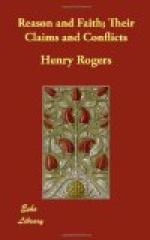____
* Of the first kind of truths, or those received by intuition, we have examples in what are called ‘self-evident axioms,’ and ’fundamental laws’ or ‘conditions of thought,’ which no wise man has ever attempted to prove. Of the second, we have examples in the whole fabric of mathematical science, reared from its basis of axioms and definitions, as well as in every other necessary deduction from admitted premises. The third virtually includes any conclusion in science based on direct experiment, or observation; though the belief of the truth even of Newton’s system of the world, when received as Locke says he received and as the generality of men receive it,—without being able to follow the steps by which the great geometer proves his conclusions,—may be represented rather as an act of faith rather than an act of Reason; as much so as a belief in the truth of Christianity, founded on its historic and other evidences. The greater part of man’s knowledge, indeed, even of science,—even the greater part of a scientific man’s knowledge of science, based as it is on testimony alone (and which so often compels him to renounce to-day what he thought certain yesterday),—may be not unjustly considered as more allied to Faith than Reason. It may be said, perhaps, that the above classification of the truths received by Reason and Faith respectively is arbitrary; that even as to some of their alleged sources, they are not always clearly distinguishable; that the evidence of experience may in some sort be reduced to testimony,—that of sense, and testimony reduced to experience,—that of human veracity under given circumstances; both being founded upon the observed uniformity of certain phenomena under similar conditions. We admit the truth of this; and we admit it the more willingly, as it shows that so inextricably intertwined are the roots both of Reason and Faith in our nature, that no definitions that can be framed will completely separate them; none that will not involve many phenomena which may be said to fall under the dominion of one as much as the other. We have been content, for our practical purpose, without any too subtle refinement, to take the line of demarcation which is, perhaps, as obvious as any, and as generally recognised. Few would say that a generalised inference from direct experience was not matter of reason rather than of faith; though an act of faith is involved in the process; and few would not call confidence in testimony where probabilities were nearly balanced, by the name of faith rather than reason, though an act of reason is involved in that process. We are much more anxious to show their general involution with one another than the points of discrimination between them. ____




